#Juleigh Howard-Hobson
Photo
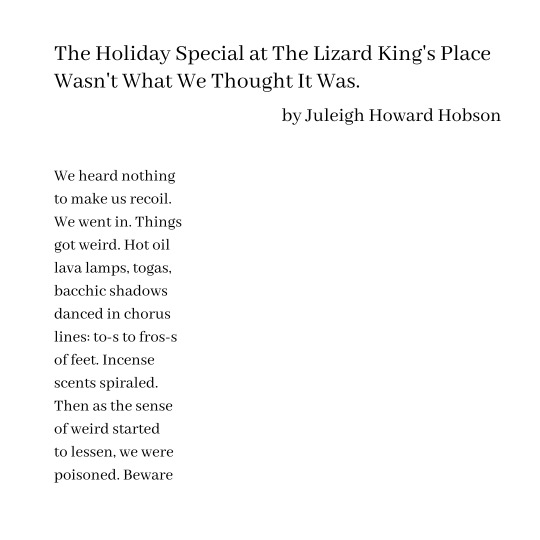
The Holiday Special at The Lizard King’s Place Wasn’t What We Thought It Was
#holiday special#poetry#the minison project#the minison zine#tmp magazine#juleigh howard hobson#poetas en tumblr#poets of tumblr#poets#poetry wanted#submissions wanted#lit mag#literary magazine
0 notes
Link
I have a queer science fiction story in Issue 31 of Shoreline of Infinity, which is now up for pre-order in both print and digital!
Cockroach is about:
- continuing to live after the world has ended
- reconciling who you are now with the person you wanted to be
- and valuing what you care about even if it isn't "important"
3 notes
·
View notes
Link
0 notes
Text
Potcake Poet's Choice: Juleigh Howard-Hobson, 'I'll Keep My Ghosts'
Potcake Poet’s Choice: Juleigh Howard-Hobson, ‘I’ll Keep My Ghosts’
“…presence, if it has been real presence, does not ever leave.”–May Sarton
I’ll keep my ghosts. Each morning down we go Through the hallway, where they begin to show As grey reflections of themselves in frames That do not answer when I call their names But swirl and curve around me, to and fro. Sometimes, in this house that they used to know So well, their unseen numbers swell and grow Until I…
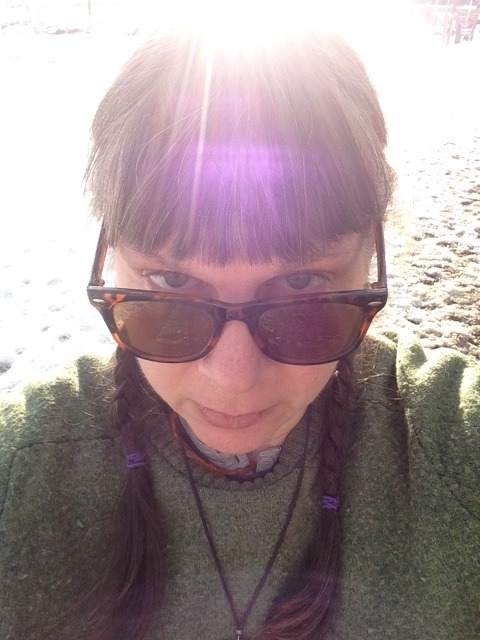
View On WordPress
2 notes
·
View notes
Text
Announcing 34 ORCHARD’S Autumn 2020 Table of Contents!
Announcing 34 ORCHARD’S Autumn 2020 Table of Contents!
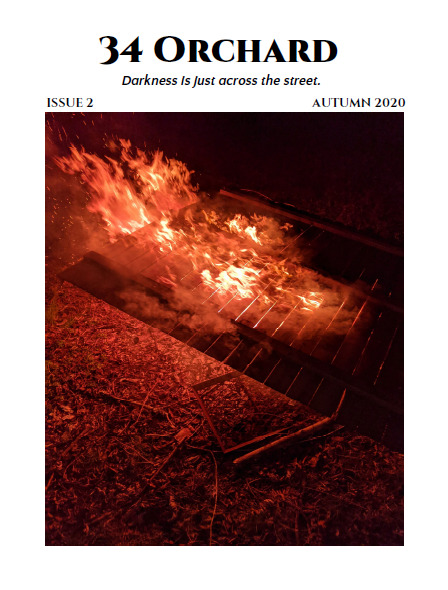
It’s been an interesting journey this time around, but I’m thrilled to announce the Table of Contents for 34 Orchard’s sophomore issue—coming to the magazine’s website here on November 10!
In this issue, twenty-one artists from everywhere burn worlds to the ground in terrifyingly beautiful ways, featuring the following art, fiction and poetry:
In the Witch House — Chris Campeau
fairy…
View On WordPress
#34 Orchard Fall 2020 issue#Amar Benchikha#Billy Bradshaw#Brandon Kawashima#C.M. Saunders#Carol Despeaux Fawcett#Chris Campeau#Clay McLeod Chapman#Corin Scher#dark fiction literary magazines#Desirae Terrien#Elizabeth J. Coleman#Ellen Andersen#Hunter Liguore#Jay Abramowitz#Juleigh Howard-Hobson#Kaitlyn Downing#Kali Meister#Liam Hogan#Lorna Wood#MK Roney#Page Sullivan#pandemic horror stories#R.A. Busby
0 notes
Text
WICKERPEDIA, ed. Kristin Garth & Nick Morrissey
WICKERPEDIA, ed. Kristin Garth & Nick Morrissey
Mixing perspectives on the power of belief, both good and bad, to shape lives with attempts to capture the experience of believing, the Garth and Morrissey create an experience as filled with poetry, awe, and horror as the films that inspired it.
… “”
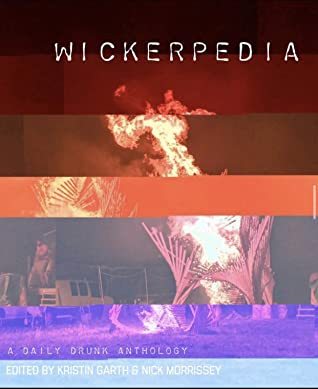
View On WordPress
#Ankur Jyoti Saikia#Barlow Adams#Claire HM#Clem Flowers#Evan J. Peterson#flash fiction#folk horror#Jack B. Bedell#Jameson Hampton#Jay Fraser#John “Hoss” Taylor Jr.#John Weagly#Juleigh Howard Hobson#Kendall A. Bell#Kristin Garth#Lawrence Moore#Madison McSweeney#Magda Knight#Marisa Silva-Dunbar#Michael Bettendorf#Mike Hickman#Monique Quintana#mysticism#Nick Morrissey#Palaces#Peach Delphine#poetry#Rasiqra Revulva#Rick Hollon#Rose Knapp
0 notes
Photo
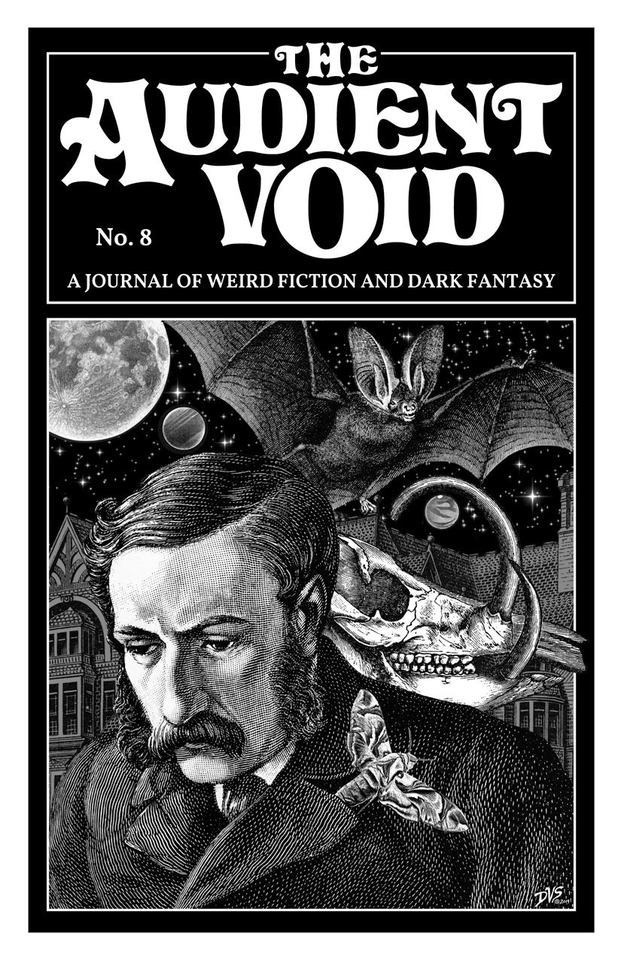
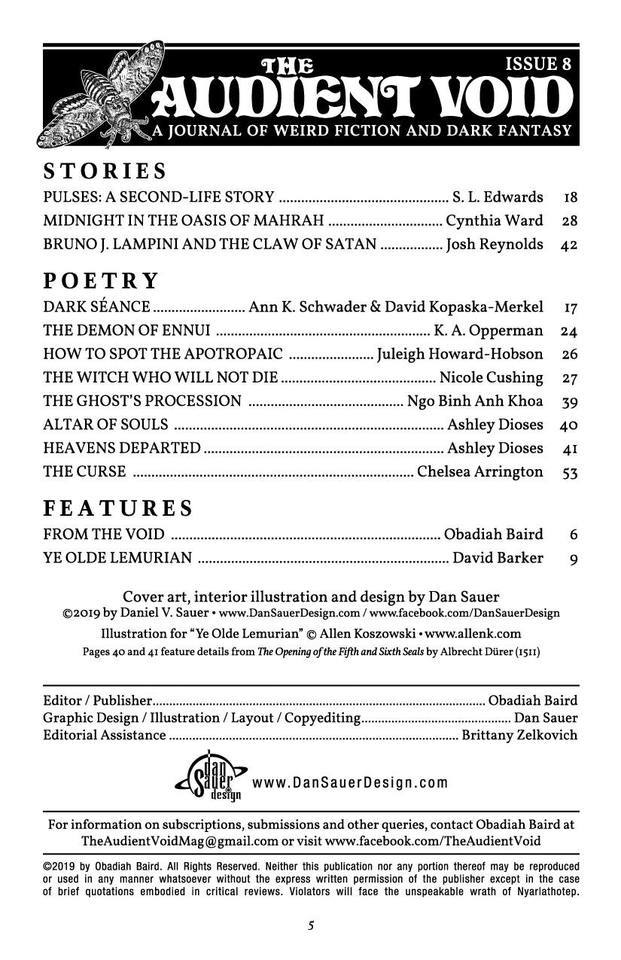
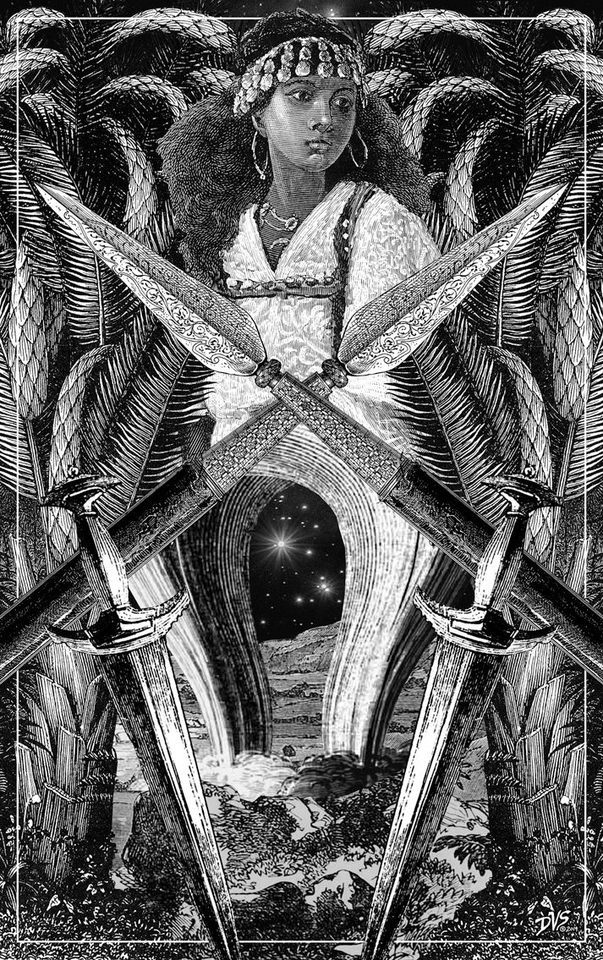
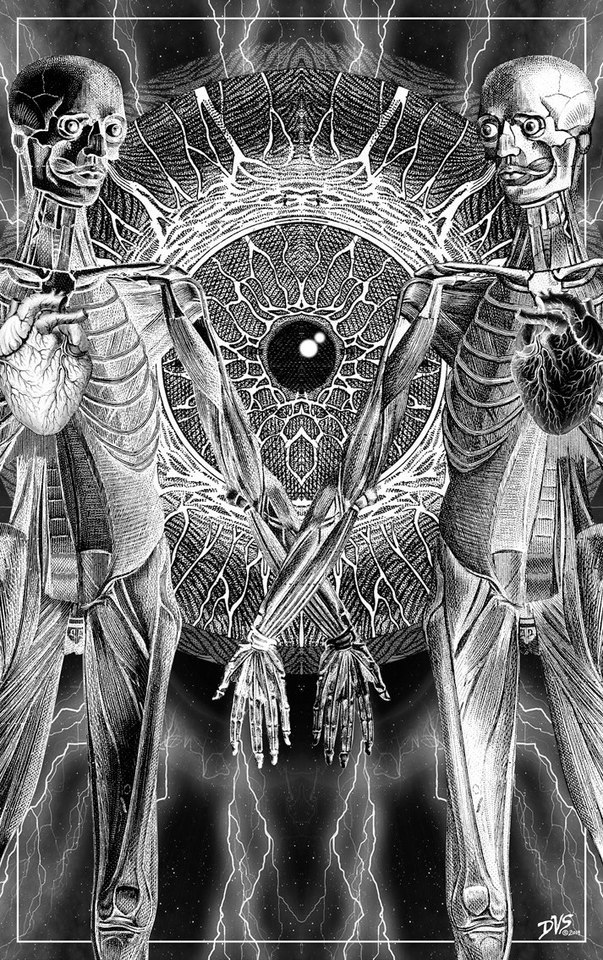
The Audient Void. Issue #8, edited by Obadiah Baird, September 2019. Cover art and interior illustrations by Dan Sauer. Info: theaudientvoid.bigcartel.com.
The Audient Void: A Journal of Weird Fiction and Dark Fantasy Issue #8.
Fiction:
"Pulses: A Second Life Story" by S.L. Edwards
"Midnight in the Oasis of Mahrah" by Cynthia Ward
"Bruno J. Lampini and the Claw of Satan" by Josh Reynolds
Poetry:
"Dark Seance" by Ann K. Schwader & David Kopaska-Merkel
"The Demon of Ennui" by K.A. Opperman
"How to Spot the Apotropaic" by Juleigh Howard-Hobson
"The Witch Who Will Not Die" by Nicole Cushing
"The Ghost's Procession" by Ngo Binh Anh Khoa
"Altar of Souls" by Ashley Dioses
"Heavens Depart" by Ashley Dioses
"The Curse" by Chelsea Arrington
Features:
"From the Void" by Obadiah Baird
"Ye Olde Lemurian" by David Barker
54 notes
·
View notes
Text
Author Interview: Juleigh Howard-Hobson
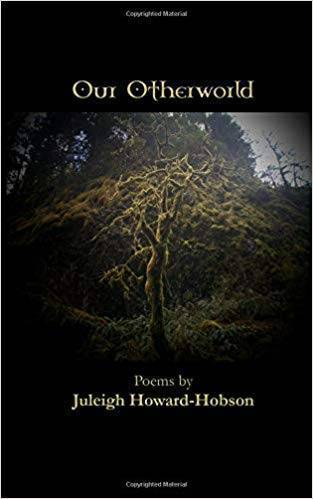
[Today, we sit down for an interview with poet and author, Juleigh Howard-Hobson. Here, she discusses living off the grid, sonnet spells, her latest poetry collection, her first novel, and building a relationship with the local wights.]
Read more...
#heathens#heathen#heathenry#norse polytheism#germanic polytheism#interviews#juleigh howard-hobson#otherworld#poetry#poems#wights#pagansquare#pagan culture#bookmusings#rebecca buchanan
0 notes
Text
Taking Five: Rekindling Wonder For the Spirit
Taking Five: Rekindling Wonder For the Spirit
Taking Five: Rekindling Wonder For the Spirit Juleigh Howard Hobson
Lethargy of spirit. It happens to all of us, from time to time, because the nature of existence is cyclic. Egg worm butterfly. Fall winter spring summer. Maiden mother crone. This doesn’t mean, though, that the lethargy we feel weighing upon us is any less painful to deal with just because we can acknowledge it to be part of a…
View On WordPress
0 notes
Text
Version livre de poche, revue Fevers of the Mind, Issues 1 et 2
Version livre de poche de Fevers of the Mind des numéros 1 et 2 sans les photographies, entrevues et biographies.
Contributeurs / Contributors come from Issues 1 & 2 of Fevers of the Mind Poetry Digest.
This is a poetry only version of Fevers of the Mind without photography, interviews, and bios, just with the poetry, prose, short stories
Fevers of the Mind Press Presents: The Poetry Only: June & August 2019 editions of Fevers of the Mind Poetry Digest Paperback – September 2, 2019
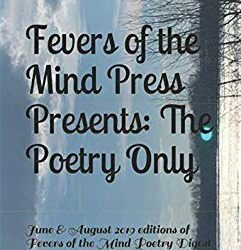
Poets included : Tianna Hansen, Scott Christopher Beebe, Jerry Masterson, Matthew Calmes, Matthew C Smith, Kristin Garth, Elisabeth Horan, Al Matheson, Samuel Guest, Guy Farmer, Juliette Sebock, David G Lee, Linda Crate, Chloe Gorman, Barbara Avon, Jamie Routley, Jennifer Hibbs, John Ogunlade, John Everex, Abuh Monday Eneojo, Anna Nash, Neel Trivedi, Roberto Zariskeeni, Ulane Vuorio, Norb Aikin, Justin Karcher, Mary Jones, ps Pirro, Kushal Poddar, JDG, Megha Sood, Matt Seeley, Paul Robert Mullen, Ceinwen Haydon, David Fladger, Rachael Ikins, Jackie Chou, Amanda Reeves, Anna Rozwadowska, Ana Lorenza-Jimenez, Amanda McLeod, Ellen Kirkman, Ruth Cheruto, Hillary Behsharam, Rickey Rivers Jr, Elizabeth Moura, Christopher Osswald, Christian Gould, Judge Burdon, Helena Fools, Anne Paulet alias Scripta 21, Stephen Watt, George Miller, Jennifer Carr, Juleigh Howard-Hobson, Rachel Cunniffe, December Lace, Lynn White, Doug Polk, Demi Whitnell, Paul Brookes, Jesse Falodun, Robin Ray, Samantha Merz, David Milburn, Pasithea Chan, Michelle Nadasi, David L O’Nan, Abigail Swire, Colin James.
Disponible aux formats Kindle/Ebook et papier/ paperback
https://www.amazon.com/dp/1690046406
https://www.amazon.com/Fevers-Mind-Press-Presents-editions-ebook/dp/B07X7Q626H
1 note
·
View note
Text
Wombwell Rainbow Interviews
I am honoured and privileged that the following writers local, national and international have agreed to be interviewed by me. I gave the writers two options: an emailed list of questions or a more fluid interview via messenger.
The usual ground is covered about motivation, daily routines and work ethic, but some surprises too. Some of these poets you may know, others may be new to you. I hope you enjoy the experience as much as I do.
Jason O’Toole,
is a Rhylsing Award nominated poet, musician, and elder advocate. He is the author of two poetry collections published by the Red Salon, Spear of Stars (2018) and Soulless Heavens (2019). Recent work has appeared in Nixes Mate Review, The Scrib Arts Journal, The Wild Word, and Vita Brevis.
The Interview
1. What inspired you to write poetry?
From a young age, poetry has been my way of sharing thoughts and observations that could not otherwise be easily introduced into conversation. As an adult, it’s also how I process trauma and grief, from surviving shoot-outs and seeing horrible events at work, to losing contact with my children in the wake of a divorce. I don’t want to self-obsess and start every poem with “I” though and many of my current poems tell stories about the down-and-out people I encounter throughout my day, whether an addict waiting for her dealer behind a building or a disabled vet whose family never visit.
2. Who introduced you to poetry?
When I entered 4th grade I had a teacher at the Albany Academy named Mrs. Everett. She was from England and “old school” in the best way. We were given short poems to memorize and recite each week such as Carl Sandberg’s “The Fog.” If we got our assignments done, she let us read books from her library, which contained classics such as Malory’s Le Morte d’Arthur.
My family had shelves full of books. My brother and I recognized that these contained the secret to the mystical power that adults had over us. He got started on the science books, and I started reading the philosophy and poetry. I didn’t always understand what I was reading but they felt familiar to me somehow. I kept a dictionary on hand to look up the meaning of words. The first poets that I recall relating best to were e.e. cummings, T.S. Eliot, William Butler Yeats, and A.E. Housman. I also discovered William S. Burroughs way too young.
2.1. Why did you find yourself relating best to “ e.e. cummings, T.S. Eliot, William Butler Yeats, and A.E. Housman.” ?
The accessible avant-gardist e. e. cummings appealed to me as his poems were stripped down to the bone yet impactful and visually appealing. His playful, off-label use of syntax and made-up words opened up possibilities for me as a kid writing my first non-rhyming poems.
T.S Eliot was another poet that every college educated family had hanging around on their shelves. The Waste Land gave me a road map for leaving the 20th Century. It didn’t go anywhere especially good, but how could it. “Well now that’s done: and I’m glad it’s over.”
William Butler Yeats was one of the greatest magickal minds of his time. I didn’t realize this on my first reading of his poems as his occult history was almost entirely glossed over by the academics. As a kid I knew there was something pagan and exciting lurking behind the verse. I also enjoyed reading the Irish folklore he and Lady Gregory preserved. Later I would learn of his run ins with Aleister Crowley and that added to the allure.
A.E. Housman’s A Shropshire Lad was written with the gloomy adolescent male in mind. I memorized several of the poems and drew cartoons to go along with them. When The Smiths came on the scene, I immediately connected with the lyrics on the Hatful of Hollow ep which seemed to have been spawned from a similar maudlin mind.
2.2. Why did you discover “William S. Burroughs way too young”?
My grandparents had friends, Vincent and Brita, who were painters who also owned an enviable art collection which included a Picasso, purchased for half-nothing before he was famous. I would sit and read in their library, and of course the title Naked Lunch jumped out at me. I was in middle school at the time. Maybe 5th grade? The strangest fiction I had read prior to this was Madeleine L’Engle’s Time Quintet and Ursla K. Le Guin’s The Lathe of Heaven. I didn’t quite know what the hell was happening in it, but it was filthy and funny. I was hooked and read almost everything Burroughs wrote before the age of 16. I enjoyed making collage and cut-ups, some of which I published in zines I made with Sam McPheeters, and during high school, Burroughs was one of my main influences along with The Situationists International, Dr. Anton LaVey, and The Church of Subgenius in my visual art, comics, poetry and prose.
3. How aware were you of the dominating presence of older poets?
In my early teens, I’d gone on my own to hear Allen Ginsberg and Anne Waldman read, and having read Burroughs, Kerouac, Corso and others associated with them, knew that I could learn a lot from the Beats. I also knew that I would have to find my own voice. I was in absolutely no rush to do so. Though I have contributed lyrics and vocals on several underground recordings of punk and experimental music and edited Situationist and Punk zines and an academic journal (Dialectical Anthropology) I did not start seriously seeking publication of my poems until 2018. Now I am one of the older poets!
4. What is your daily writing routine?
I never know when I will be struck by the need to write a poem or story. Almost none of my poems are planned. I don’t sit down and say, “I’m going to bang out a poem about a seagull.” I might overhear a phrase in conversation, read a terrible on-line review, or have a traumatic memory resurface. I always keep a notebook on me so I can jot down whatever strikes me as worth recording. Some of these notes wind their way into poems.
Less often I will write short stories, essays, or tinker with one of my novels-in-progress. I find that speculative fiction allows me to hide real stories and people (from my work as an investigator) in plain sight and process some of my worst experiences.
5. What motivates you to write?
Poets and authors have helped me make sense of being human better than any church ever could. I hope I can help others unravel some of the mysteries, complexities and inanities of existence. For some of us, it’s a matter of survival – finding a reason to stay sober, make less terrible choices, and get through another day.
6. What is your work ethic?
Many people complain that they have no time to write. I do my best not to have unmet obligations hanging over me. I pay my bills, get the laundry done, never leave a dish in the sink. I may find other reasons to procrastinate, but at least I won’t waste time worrying about daily chores and it’s easier to write with a clean house.
7. How do the writers you read when you were young influence you today?
I feel a distinct kinship with certain poets and authors. There is a lineage that exists for writers akin to the lineages in religious orders, martial arts schools or royalty. There are poets I read in my teens and twenties who I abhor now, such as Bukowski. I still read him now and again, perhaps as a reminder of what not to be. As for my own tribe, I’ll read Corso and then follow the stream back to Shelley who defined “the pain of bliss” that both poets articulated. I’ll jump from Ignatow’s mountains and bagels, to Williams, “No ideas but in things” to Whitman’s sacred bodies, and to teenage rebel Rimbaud, and then back to where I find – myself.
8. Who of today’s writers do you admire the most and why?
Juleigh Howard-Hobson is a fellow avant-garde traditionalist. Unlike most modern poets, she is also a formalist. Despite poems written in form not being in style, she is prolifically published and has earned awards and several important nominations. She’s also published fiction and non-fiction, all while living off the grid and running a small family farm in the Pacific Northwest. As one of my mentors, Juleigh has been generous with her time and is always willing to share calls for submissions and her extensive knowledge of the small presses and poetry journals.
9. Why do you write, as opposed to doing anything else?
I am a fair guitar player, have managed to sell some of my art in galley shows, and apparently my singing is okay for what it is, but poetry is the one thing I feel I have the ability to be “the best” at if I focus more of my energy on reading, appreciating and writing poetry. It’s sometimes a solitary exercise, but there is a vibrant community out there as well. Now that I’ve been sober for three years and am not a resentment machine, I can get along fairly well with other poets and maybe even be an asset to the community.
10. What would you say to someone who asked you “How do you become a writer?”
I can only answer how one might become a writer like myself. There are many paths, and some are surely more lucrative than my own. First you must be a reader. I don’t trust poets who don’t read other poets. I believe they are only taking selfies with words.
Secondly, you must be a listener and understand that listening isn’t the opposite of talking. It’s an active role. Be a semiotician and try to understand why people are saying what they are saying. Why are they choosing certain words over others? Pay attention to tone of voice, body language and the messages that they are trying to convey with their personal style. This practice of reading the signs that people flash, has the added benefit of anticipating problems, and could save your life!
Get outside, have some adventures, mix it up with people outside of your usual circle, and observe everything. Try to spot the details that others miss. Drive to some town you’ve never been to before and spot what’s different about it from your town. What are the names on the headstones? What are the mom and pop businesses selling? Get out of the car and talk to people and ask them questions and you may learn of local legends, ghost stories, and witch’s graves.
Stay curious and be present in life. Maybe then you’ll have something interesting to tell the rest of us. People love a good story, so you have that in your favour from the start. Go find one.
11. Tell me about the writing projects you have on at the moment.
I am contributing spoken word to recordings with Herr Lounge Corps and we should have an album out before long. I am performing and recording stateside with Alec K. Redfearn, a Providence based composer of weird music. I plan on introducing and editing the collected poems of a certain forgotten female poet and occultist. Some of my weird fiction stories have been published by horror presses and I’m slowly working on a couple of novels. I’m gratified that my poems have been published in journals and anthologies around the world, that I’ve been nominated for the Rhysling Award, and that I have more than enough for a third collection when the time is right. People are reading my writing and are reaching out to tell me what it means to them. For me, that means everything.
Wombwell Rainbow Interviews: Jason O’Toole Wombwell Rainbow Interviews I am honoured and privileged that the following writers local, national and international have agreed to be interviewed by me.
0 notes
Link
Tribes ist mehr als nur eine Ausgabe einer Zeitschrift.
Es ist ein durchdachtes Kompendium vieler Facetten des Nationalanarchismus.
Auch wenn jeder Artikel ziemlich individuell ist, ist dies eine zusammenhängende Publikation,
die sowohl Ideen als auch über die Nationalanarchie untersucht und präsentiert.
Adam Ormes, der Tribes redigierte und alles koordinierte , macht einen guten Job mit der Untersuchung und Erforschung von Wurzelkonzepten der Nationalanarchie in seinem Artikel "The Challenge of National- Anarchismus ", der das Magazin öffnet.
Ormes schreibt durchweg überzeugend und macht den Artikel lesbar, eine ausgezeichnete Wahl für das erste Stück (übrigens, es sind die feinen Details wie diese,
die wirklich ein Magazin zusammenbringen, die Tatsache, dass National-Anarchisten davon Kenntnis haben,
spricht Bände für ihre Stärke der Vision und Klarheit der Organisation).
Als eine Person, die aus der modernen Welt ausgetreten ist, um eine Familie auf zehn Morgen in der Mitte von Nirgendwo aufzuziehen, mag ich, dass er seinen Artikel auf die praktische Seite der Nationalen Anarchie abschließt:
"Mein Rat ist:
Einen Weg zu finden sein Leben nach dem Nationalanarchismus auszurichten mit den Werten zu leben und neue Werte zu schaffen, die dir wichtig sind,
und wenn du kannst, ganz weit weg von Großstädten,
um eine gute Chance zu haben, das zu schützen,
was du bauen solltest,
sollte der Zusammenbruch der Gesellschaft schnell voranschreiten.
Es ist wahrscheinlich notwendig,
einen gemeinsamen Sinn für das Heilige zu entwickeln.
Und versuche, deinen Sinn für Humor beizubehalten, während du darüber nachdenkst - es könnte eines deiner wertvollsten Güter sein. "
By Juleigh Howard-Hobson
http://www.national-anarchist.net/
https://www.youtube.com/Idealismusleben
https://attackthesystem.com/…/a-review-of-tribes-the-natio…/
0 notes
Quote
We rise. Perhaps imperceptibly. Still
We rise despite this world. It is not in
Us to languish like lesser people will,
We were not made for that. Anger wears thin,
Impatience grates, anxiety and its
Twin, regret, do nothing but make us lose
Sleep. Leave such things to the common masses
Festering in their hopelessness — they chose
To do nothing to improve their fate. We
Rise. Every one of us, no matter how
Long it takes, how hard the climb; if need be
We pass the torch, but we do not allow
It to fall away from who we are, and
Who we will be. We rise. And then we stand.
Juleigh Howard-Hobson
0 notes
Text
More's The Pity, Enoch Powell
“Another thing is no matter how much you think you love somebody, you’ll step back when the pool of their blood edges up too close” -Chuck Palahniuk
Rivers of blood were what you saw ahead,
But they weren’t rivers, Enoch, instead
They were stagnant pools of blood that choke
But do not rise, swell but do not move, soak
And fester, flowing nowhere; each one fed
By far off well springs that bring but fetid
Ooze. No aqua pura beneath what’s bled
By these shores, nothing but a bloody joke:
Rivers of blood
That do not wash away and are not red
Like English roses and St. George. What’s bred
Within them shall not evolve, cannot evoke
A semblance of the nation or the folk
Who’ve stepped back, lost to the unmoving dread
Rivers of blood.
1 note
·
View note
Photo

Celtic Poetic Inspiration: The Triple Gift of Imbas Celtic Poetic Inspiration: The Triple Gift of Imbas Juleigh Howard Hobson Imbas (pronounced: im-bus) is an ancient Celtic term for inspiration.
0 notes
Text
Crowning Magic of the Bay Tree
Crowning Magic of the Bay Tree
Crowning Magic of the Bay Tree Juleigh Howard-Hobson
Folk magic being what it is: directed arcane power practised by people using supplies readily available to them rather than wasting time and money accumulating the more rare and/or expensive pointedly-occult items — it is hardly surprising that the kitchen pantry holds more magical potential than most people think.
Laurus nobilis, the Bay…
View On WordPress
0 notes